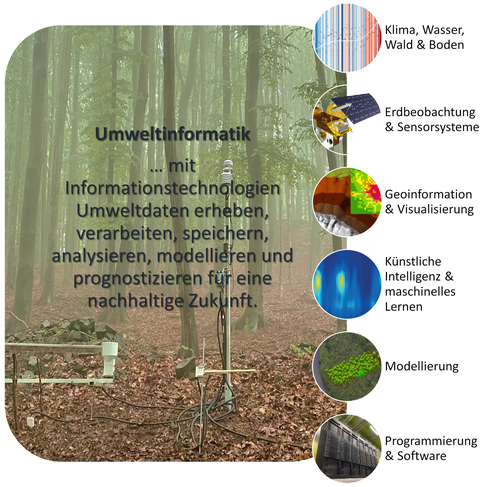Inhaltsverzeichnis
Studienvoraussetzungen
Voraussetzung für die Aufnahme des Studiums ist die allgemeine Hochschulreife (Abitur) oder eine vergleichbare Hochschulzugangsberechtigung.
Es werden Englischkenntnisse auf dem Niveau B2 des Gemeinsamen Europäischen Referenzrahmens für Sprachen gefordert. Der Nachweis erfolgt beispielsweise durch ein Zeugnis über die allgemeine Hochschulreife, welches die Fremdsprache Englisch umfasst, ein Zeugnis der vollständig in englischer Sprache abgelegten Hochschulreife oder anhand des Ergebnisses eines international angebotenen Tests, beispielsweise TOEFL (72), IELTS (5,5), UNIcert II.
NC-Auswahlverfahren
Allgemeine Informationen zum Auswahlverfahren in NC-Studiengängen sowie die Grenzwerte der letzten Zulassung in zurückliegenden Verfahren finden Sie
hier.
Sprachvoraussetzung Deutsch
Internationale Studienbewerber:innen sowie deutsche Bewerber:innen mit ausländischer Hochschulzugangsberechtigung informieren sich bitte auf folgender Seite: erforderliche Sprachkenntnisse.
Informationen zum Studienkolleg
Studienbewerber:innen mit einer ausländischen Hochschulzugangsberechtigung, welche gemäß den Bewertungsrichtlinien der Kultusministerkonferenz (KMK) keinen direkten Hochschulzugang in Deutschland ermöglicht, müssen vor Studienbeginn ein Studienkolleg besuchen. Hier können Sie die fachgebundene Hochschulzugangsberechtigung erwerben.
Weitere Informationen finden Sie auf den Seiten zum Studienkolleg.
Der ausgewählte Studiengang ist folgendem Schwerpunktkurs am Studienkolleg zugeordnet:
T-Kurs
Allgemeines zum Studiengang
Die Bewältigung globaler Umweltprobleme wie Klimawandel, Artenverlust und Ressourcenknappheit und deren Auswirkungen auf Wirtschaft und Gesellschaft erfordert innovative Lösungen. Die Informatik spielt dabei eine Schlüsselrolle – von Umweltüberwachung, Frühwarnsystemen, künstlicher Intelligenz bis hin zu nachhaltigen Technologien. Der Bachelorstudiengang Umweltinformatik an der TU Dresden verknüpft Umweltwissenschaften mit Informatik und kombiniert damit Klima- und Ökologiefragen mit Big Data, Datenanalyse und Künstlicher Intelligenz. Getragen durch die Fakultät Umweltwissenschaften in Kooperation mit der Fakultät Informatik, umfasst das Studium Inhalte aus Geo-, Hydro- und Forstwissenschaften sowie der Angewandten Informatik. Absolvent:innen erwerben fundierte Kenntnisse in Umweltprozessen, Programmierung, Datenanalyse, Statistik und maschinellem Lernen und sind qualifiziert für Tätigkeiten in Umweltmonitoring, -planung und Datenanalyse in Behörden und Unternehmen.
Studieninhalt
Der Bachelorstudiengang Umweltinformatik besteht aus sechs Semestern mit insgesamt 180 Leistungspunkten. Es ist ein Teilzeitstudium möglich. Ausgehend von einer breiten Grundlage in den Gebieten Umweltinformatik, Umweltwissenschaften, Informatik und Grundlagen der Mathematik in Pflichtmodulen im 1. bis 3. Semester erfolgt eine Spezialisierung in zwei Schwerpunkten ab dem 4. Semester, die schließlich in einer vertiefenden Auseinandersetzung mit einem Thema in der Bachelorarbeit (6. Semester) mündet. Der Studiengang stattet alle Studierenden mit einem breiten methodischen Knowhow aus.
Das Bachelorstudium Umweltinformatik umfasst im Pflichtbereich theoretische und methodische Grundlagen zu Kernfächern der Umweltinformatik wie:
• Grundlagen und Forschungsmethoden der Umweltinformatik, insbesondere Grundlagen der Geoinformatik, Kartographie, Geosoftwareentwicklung, Geostatistik, Photogrammmetrie, und Fernerkundung
• Wissenschaftliches Arbeiten und Umweltdatenmanagement, und Data Analytics in den Umweltwissenschaften
• Grundlagen der Mathematik, insbesondere Lineare Algebra, Analysis und Differential- und Integralrechnung.
• Grundlagen der Umweltwissenschaften, insbesondere Grundlagen der Hydrologie und Meteorologie, Biogeographie, Geologie und Bodenkunde, und Geophysik
• vertiefende Themen zu Geographischen Informationssystemen und Geodatenbanken, Maschinelles Lernen für Umweltmonitoring und -modellierung, sowie Grundlagen von Geosensoren
• Grundlagen der Informatik, insbesondere Programmierung, Algorithmen und Datenstrukturen, und Mensch-Computer Interaktion,
• umwelt-informatische Arbeitsergebnisse aus der Berufspraxis
• allgemeine Schlüsselqualifikationen, beispielsweise Präsentationstechniken, Sprachen, Organisation und Management
Eine Wahl von Schwerpunkten ermöglicht ab dem vierten Semester eine Differenzierung durch Spezialisierung. Diese wird sichergestellt durch die Möglichkeit der Wahl von zwei aus sieben Schwerpunkten. Als Schwerpunkte stehen Geo- und Umweltinformatik, Hydrologie, Meteorologie, Stadtentwicklung und Landmanagement, Geodynamik, Waldökologie und Forstwissenschaften, und Informatik zur Auswahl. Alle Schwerpunkte bestehen aus Wahlpflichtmodulen womit eine flexible Studiengestaltung und individuelle Profilbildung ermöglicht wird.
Das fünfte Semester dient maßgeblich der individuellen Spezialisierung und ermöglicht einen vorübergehenden Aufenthalt an einer anderen Hochschule oder einen Auslandsaufenthalt (z.B. über ERASMUS). Das einzige Pflichtmodul im fünften Semester sind „Allgemeine Schlüsselqualifikationen“, welche zum Beispiel durch einen Sprachkurs an einer ausländischen Hochschule erbracht werden können. Alle weiteren Module im fünften Semester sind Wahlpflichtmodule, die aus den beiden Schwerpunkten gewählt werden.
Zu Beginn des sechsten Semesters ist eine berufspraktische Tätigkeit im Umfang von 7 Wochen vorgesehen, die zur weiteren Profilbildung beiträgt. Weiterhin wird im sechsten Semester ein weiteres Wahlpflichtmodul belegt, welches entweder aus einem der beiden gewählten Schwerpunkte oder aus dem Gesamtangebot gewählt wird. Das sechste Semester schließt mit der Abschlussarbeit und einem begleitenden Kolloquium ab. Das Thema der Bachelorarbeit orientiert sich dabei in der Regel an den Inhalten der gewählten Schwerpunkte.
Besonderheiten
Der Studiengang verbindet deutschlandweit einmalig Umweltwissenschaften aus den Bereichen Geo-, Forst- und Hydrowissenschaften mit Informatik.
Auslandsaufenthalt
Lust auf ein Semester im Ausland? Auslandssemester, -praktika oder Sprachkurse – als Student:in profitieren Sie auf jeden Fall von einem Auslandsaufenthalt. Sie können Ihre Fach- und Sprachkenntnisse verbessern, Kontakte knüpfen, Freunde gewinnen, andere Kulturen kennenlernen und vieles mehr. Dafür ist im Studiengang das fünfte Semester vorgesehen, in dem Sie einen Auslandsaufenthalt einplanen können. Mehr Informationen gibt es auf den Seiten des International Office
Berufsfelder
Umweltmonitoring, -planung, Datenanalyse und Informationstechnologien in Behörden und Unternehmen
Studiendokumente
Die Amtlichen Bekanntmachungen der TU Dresden beinhalten alle veröffentlichten Ordnungen. Benutzen Sie die Suchmöglichkeiten, um die gewünschten Dokumente zu finden: Amtliche Bekanntmachungen
Zusätzlich sind die Ordnungen auf den Webseiten der zuständigen Einrichtung auffindbar.
Kontakte
Zentrale Studienberatung
Studienberaterin
Frau Dr. Antje Beckmann
Besuchsadresse:
Fritz-Foerster-Bau (FOE), Mommsenstr. 6, 01069 Dresden, Etage 0, Raum E58
Postanschrift:
TU Dresden
Zentrale Studienberatung
01062 Dresden
- Tel.
- +49 351 463-36279
Studienberaterin
Frau Dipl.-Psych. Franziska Klinkewitz
Besuchsadresse:
Fritz-Foerster-Bau (FOE), Mommsenstr. 6, 01069 Dresden, Etage 0, Raum E65
Postanschrift:
TU Dresden
Zentrale Studienberatung
01062 Dresden
- Tel.
- +49 351 463-39724
Fakultät Umweltwissenschaften
Fachberaterin
Frau Dr. Katja Lohse
Postanschrift:
TU Dresden
Fakultät Umweltwissenschaften
Fachrichtung Geowissenschaften
01062 Dresden
- Tel.
- +49 351 463-32041
Sprechzeiten:
Bitte Termin vereinbaren bzw. Sprechzeiten beachten.
Immatrikulationsamt
ServiceCenterStudium
Postanschrift:
Technische Universität Dresden
Immatrikulationsamt
01062 Dresden
- Tel.
- +49 351 463-42000
Sprechzeiten:
International Office
International Office
Besuchsadresse:
Fritz-Foerster-Bau (FOE), Mommsenstr. 6, Ostflügel/1. Etage, Raum 178
Postanschrift:
TU Dresden
Internationale Office
01062 Dresden
- Tel.
- +49 351 463-42000
Sprechzeiten:
- Dienstag:
- 13:30 - 15:30
- Donnerstag:
- 13:30 - 15:30
Terminvereinbarung für die Sprechzeiten bitte über den SCS Servicepoint im Foyer!

